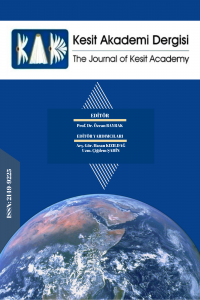TUTUM, HUKUKSAL YAPI VE ETNİK-DİLSEL ÇEŞİTLİLİĞİN GELİR ÜZERİNDEKİ ETKİSİ
Tutum, Hukuksal Yapı, Etnik Farklılıklar, Gelir
THE IMPACT OF LATITUDE, COMMON LAW AND ETHNO-LINGUISTIC FRACTIONALIZATION ON INCOME
Latitude, Common Law, Ethno-Linguistic Fractionalization, Income,
___
- Acemoglu, D., S. Johnson, and J. Robinson. 2001. “The Colonial Origins of Comparative Deve- lopment:An Empirical Investigation.” American Economic Review 91: 1369–1401.
- Alesina, A.,W. Easterly, A. Devleeschauwer, S. Kurlat, and R.Wacziarg. 2003. “Fractionaliza- tion.” Journal of Economic Growth 8: 155–194.
- Collier, P., & Gunning, J. W. (1999). Why has Africa grown slowly? Jounal of Economic Perspecti- ves, 13(3), 3–22.
- Easterly, W., & Levine, R. (1997). Africa’s growth tragedy: Policies and ethnic divisions. Quar- terly Journal of Economics, 112(4), 1203–1250.
- Garoupa, Nuno ve Carlos Gomez Liguerre (2012), The Efficiency of the Common Law: The Puzzle of Mixed Legal Families, Texas A&M University School of Law Texas A&M Law Scholarship No.671.
- Glaeser, E.L., R. La Porta, F. Lopez-de-Silane, and A. Shleifer. 2004. “Do Institutions Cause Growth?”Journal of Economic Growth 9: 271–303.
- Güney, Taner (2017) Governance and sustainable development: How effective is governance?, The Journal of International Trade & Economic Development, 26:3, 316-335.
- Hall, R. E., & Jones, C. I. (1999). Why do some countries produce much more output per worker than others? Quarterly Journal of Economics, 114(1), 83–116.
- La Porta, R., F.L. de-Salines, A. Shleifer, and R.W. Vishny. 1997. “Legal Determinants of Exter- nal Finance.” Journal of Finance 52 (3): 1131–1150.
- La La Porta, R., F.L. de-Salines,A. Shleifer, and R.W.Vishny. 1999. “TheQualityofGovernment.” Journal of Law, Economics, and Organization 15 (1): 222–279.
- Mahoney, Paul (1999), The Common Law and Economic Growth: Hayek Might be Right, UNI- VERSITY OF VIRGINIA SCHOOL OF LAW Legal Studies Working Papers Series No. 00-08.
- Majid, Muhammad Farhan, (2013) ‘‘The Persistent Effects of in Utero Nutrition Shocks Over the Life Cycle: Evidence From Ramadan Fasting,’’ GCC Working Paper Series: 13-05.
- Posner, Richard A. 2007. Economic Analysis of Law (7th ed.). New York, NY: Aspen Publishing.
- Rodrik, D., A. Subramanian, and F. Trebbi. 2004. “Institutions Rule: The Primacy of Institutions Over Geopraphy and Integration in Economic Development.” Journal of Economic Growth 9: 131–165.
- Tatoğlu, F. Y. (2012a). Panel Veri Ekonometrisi: Stata Uygulamalı, Beta Basım Yayın, İstanbul.
- Tatoğlu, F. Y. (2012b). İleri Panel Veri Ekonometrisi: Stata Uygulamalı. Beta Basım Yayın, İstan- bul.
- Van Ewijk, Reyn, (2011) ‘‘Long-Term Health Effects on the Next Generation of Ramadan Fasting during Pregnancy,’’ Journal of Health Economics, 30: 1246–1260.
- Başlangıç: 2015
- Yayıncı: Asos Eğitim Bilişim Danışmanlık San. Tic. Ltd. Şti.
YABANCI UNSURLU ELEKTRONİK TÜKETİCİ SÖZLEŞMELERİNİN MÖHUK KAPSAMINDA İNCELENMESİ
BİR MÜZİK ARKEOLOĞU: SEMA MORİTZ A MUSIC ARCHAEOLOGIST: SEMA MORİZ
SAĞLIK ALANINDA ÖĞRENİM GÖREN ÖN LİSANS ÖĞRENCİLERİNİN YAŞLI AYRIMCILIĞINA İLİŞKİN TUTUMLARI
Merve KOLCU, Mümine KALINDEMİRTAŞ KÜÇÜK
TUTUM, HUKUKSAL YAPI VE ETNİK-DİLSEL ÇEŞİTLİLİĞİN GELİR ÜZERİNDEKİ ETKİSİ
ANTALYA ŞEHRİNDEKİ GENEL SEÇİMLERİN 1983-2015 DEĞERLENDİRİLMESİ
Veysi GÜNAL, Mehmet IŞIK, M.sait ŞAHİNALP
Mehmet Sait ŞAHİNALP, Bedir ÇİFTÇİ, Veysi GÜNAL
17. YÜZYIL TOPKAPI SARAYI ÇİNİ PANOLARINDA YER ALAN ÇİÇEK MOTİFLERİ
ESKİ TÜRK-İSLAM DEVLETLERİ’NDE YAKINMA ŞİKÂYET KURUMLARI
Hasan Mahmut KALKIŞIM, Kadir Caner DOĞAN
ISTRANCA YILDIZ ORMANLARININ REKREASYON POTANSİYELİNİN GÜLEZ METODU İLE DEĞERLENDİRİLMESİ
